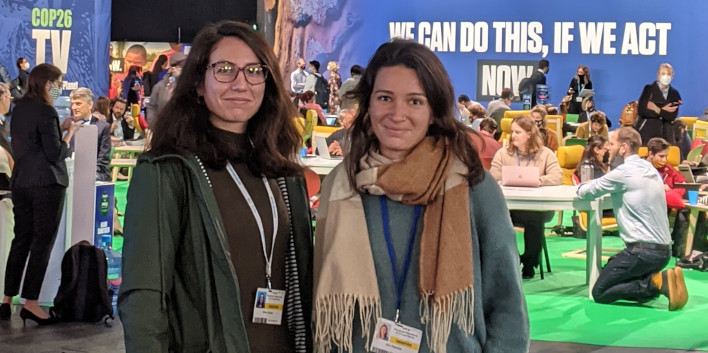ATD Fourth World at COP26 in Glasgow: Standing up for Climate Justice

Photo above: Aria Ribieras and Céline Caubet, ATD Fourth World delegates at COP26 in Glasgow, 2021 © ATD Fourth World
From November 1 to 12, a delegation from ATD Fourth World participated in COP26 in Glasgow, Scotland. Its objective was to ensure that people in extreme poverty were not forgotten in the climate negotiations.
The “most exclusive” COP: people in poverty shut out of negotiations
Although people living in the greatest deprivation are the least responsible for climate change but the first to be impacted, COP26 failed to deliver on its promise to include them properly in the negotiations. For example, due to difficulties in accessing vaccines, visas, or funds for travel and accommodation, many representatives from the least developed countries were unable to attend.
Even for those who managed to attend, and despite the observer status granted to about 100 non-governmental organizations, only a small number of delegates were allowed into the negotiation rooms. This made it difficult for people in poverty or even their representatives to have a voice during the negotiation sessions. In addition, more accreditations were issued to participants with fossil fuel interests than any national delegation.
During these two weeks of negotiations, ATD Fourth World delegates met with ministers as well as representatives of institutions and associations. The delegates constantly reminded them of the need to integrate poverty eradication into efforts to address climate change, and the need to design transition policies and programs based on the experience of people in the deepest poverty so that the projects implemented do not turn against them.
For example, in Senegal, a measure was put in place in 2016 to ban the use of plastic bags and replace them with biodegradable bags. This measure may seem commendable but these plastic bags are the only way for a large part of the population to access drinking water at a reasonable price. This measure penalizes them because the biodegradable bags are more expensive and more fragile while this population still does not have access to the drinking water network.
“By making decisions without consulting those who already have the most difficulty in accessing basic rights, a whole part of the population risks being penalized even by well-intentioned measures”, confided Elhadji, a friend of ATD Fourth World who is involved in the ecological transition in Dakar. On the other hand, he also reported that popular hearings have allowed his city to build its sustainable strategy in the face of increasingly frequent flooding in one of its neighborhoods.
We cannot allow the ecological transition to become a pretext for once again excluding those who experience the greatest hardship. This transition is essential and urgent, and it must allow the improvement of the living conditions of those who already suffer the most from the impacts of climate change.
An agreement that timidly mentions human rights and the struggle against poverty
The Glasgow Agreement has the merit of revealing the mechanisms that contribute to climate and environmental change, but the measures taken also reveal the weakness of the commitments of the Northern states to those of the South. Climate justice is mentioned but far from being implemented, even though it is urgent and imperative.
A week ago, Alain, a Swiss Fourth World Activist, said, “The ecological question scares me a lot. I have the impression that we will be even poorer. The more we do about the climate, the more poverty we will create. We must give everyone the dignity of life. For me, the fight is to bring this vision of giving a planetary balance.”
In 2015, the Paris Agreement already provided for climate action to contribute to the elimination of poverty and the respect for human rights. ATD Fourth World is pleased that the text of the Glasgow Agreement repeatedly cites the need to consider poverty eradication and that Article 52 of the Agreement “recognizes the need to ensure just transitions that promote sustainable development and eradication of poverty, and the creation of decent work and quality jobs…”.
On the other hand, ATD Fourth World strongly regrets that the Glasgow Agreement still expresses only intentions without concrete translation into action in both Northern and Southern countries.
It is now expected that the States will take action by including in national laws measures that integrate the struggle against poverty with the struggle against climate change. This requires the participation of people in extreme poverty in the elaboration and monitoring of national and local plans, programs, and projects (climate, mobility, construction, urbanism, air quality, risk, water management).
In order to avoid the most vulnerable communities and people being more affected, ATD Fourth World will ensure that the implementation of the Paris Agreement is based on human rights and reaches the poorest 20% as a priority.
In line with Article 52 of the Glasgow Agreement, ATD Fourth World calls for just transitions to be effectively ensured in all states that promote sustainable development and the elimination of poverty.
Social and environmental justice will only be implemented if climate action is an opportunity to eliminate poverty.
Stop Climate Apartheid: download and read ATD Fourth World’s position paper

